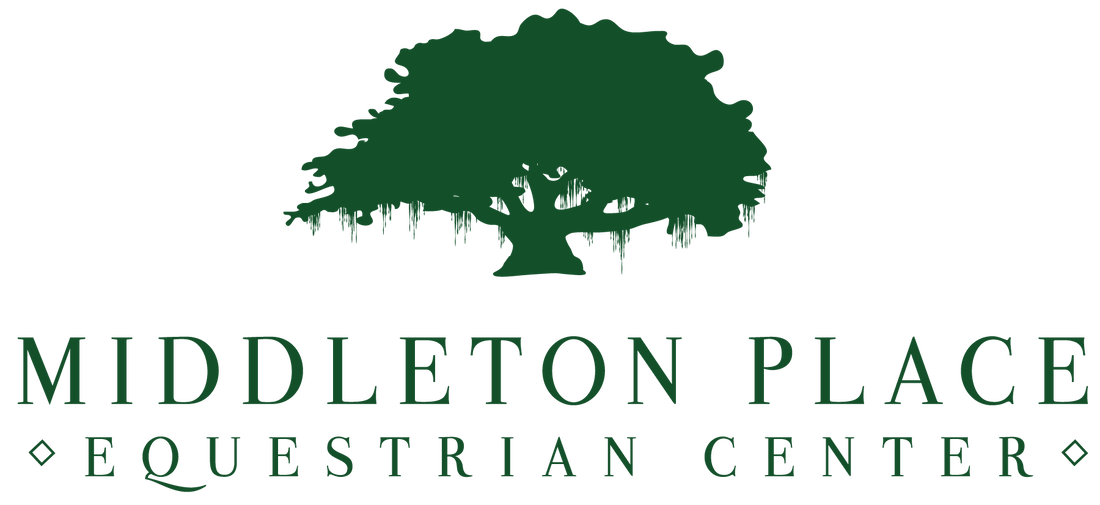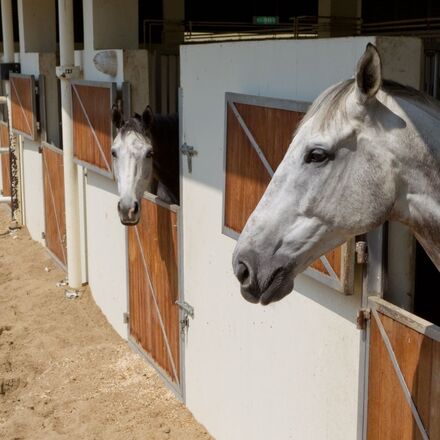 To kick off this New Year, we are going to be talking about one of our most important services and attributes; boarding your horse at Middleton Equestrian Center! Hello trail friends, a very happy new year to all of you! We hope you had a wonderful holiday season with your loved ones, and we hope you had the opportunity to take advantage of our last two blogs. We hope you took those tips and suggestions to heart to prepare your horses, stables, and barns for the cold winter weather that has finally arrived. While we might not see snow this year as our friends in North Carolina or our friends farther up north will, it has still been cold and wet here in the Lowcountry. Speaking of the Lowcountry, did you give the gift of Middleton this past holiday season? Or did you receive the gift of a trail ride with us? We can't wait to see you soon to celebrate that gift together. We are currently doing our Historic Trail Rides every day at 10 am, 12 pm, and 2 pm, with additional 4 pm rides on Friday, Saturday, and Sunday. We do prefer that you book your rides online, but you can also call us at 843-556-0449. Are you looking for the best trail rides and horseback riding in Charleston, South Carolina? You've found it! We have beautiful trails that intertwine through age-old treas, inspiring views of Middleton Place, and a guide that will accompany you to describe the history and stories we've seen and learned over the years. Middleton Place Equestrian Center is guaranteed to please all of your friends and family! We also ended 2020 on a high note, and were awarded Travelers Choice in 2020 by TripAdvisor! One of our most important services and offerings at Middleton is our horse boarding! We want to share more about it with you and talk more about it this year, so please make sure to keep up with our blog and contact us with any questions or comments. We are Charleston's premier boarding and training facility. Our boarding barns feature 46 spacious and well ventilated 12' by 12' stalls, wood shavings, individual fans, and thick stall mats. Our boarding includes feeding your horse high-quality grains and timothy/orchard hay 2-3 times per day based on each horse's individual dietary needs, owner-supplied medications and/or supplements, heightened turnout in one of our numerous large grass paddocks, stall maintenance, and seasonal blanketing. Staff members can schedule vet and farrier services as needed and perform deworming and vaccinations. For all of those new to Middleton Place Equestrian Center and to the idea of boarding your horse in South Carolina, we wanted to dedicate this blog to you and talk about some of the most important reasons and benefits of boarding your horse!
This list could go on and on trail friends, but these are the top benefits of boarding your horse and the many reasons why you should board with us at Middleton Equestrian Center. While boarding and its expenses might seem overwhelming to many new horse owners, think about all the time and money it will end up saving you overall. Also, consider the fact that you'll be able to spend more time with your horse doing exactly what you love. While you might not be able to hear or see them first thing in the morning, you also won't be getting up at the crack of dawn in the worst types of weather to care for them either. We would love to have you board with us! For more information or questions, please don't hesitate to reach out to us! Until next time, stay safe, and be well. We look forward to seeing you on our trails soon!
8 Comments
In part two of this blog series, we are going to finish talking about preparing your horses, barns, and stables for winter!
Hello trail friends, and welcome back to the blog! We hope that you've been working on going through the checklist we shared with you in part one of this blog and putting it to good use for your horses, stables, and barns! We also hope that it helped prepare you with any last-minute items you might have forgotten or might have not even thought about. For all of our first-time horse owners, we know that every changing season brings another lesson to learn, more excitement, and even more surprises. Owning a horse for the first time is very similar to having a child. It is a beautiful and magnificent creature that needs your help, dedication, and care. The longer you have your horse you find out more and more things that all the manuals and books never mentioned. They're worth it though, aren't they? While so many people might hate the cold weather, especially for those not used to it here in Charleston or the South East, it might surprise you that it can still be a very wonderful and beautiful season with your horse. There is nothing quite like seeing a horse crunch its way through a frosty field in the morning while their breath puffs up around their head. There is also nothing like watching a horse play in the snow, but that might be an even rarer event here in Charleston. You might have to make a trip up north to see that! To make this winter season as special as it can be, make sure to take this blog to heart. Make sure to follow all of the tips, suggestions, and ideas we are providing in both of these checklists to allow both you and your horse to enjoy this chilly season. If you put the work in, this will be an easy winter to navigate and work through. After this crazy year, that is something we all need, right? For all of our horse owners, don't forget that we have some of the best horse boardings right here in Charleston. We are here to help care for your horse when you need it most. If your stables are barns are ill equipt for the season, if you need to go out of town on an emergency, or just need an extra pair of hands Middleton Equestrian Center boarding is here for you. Please don't hesitate to reach out and talk with us if you have any questions or comments about our horse boarding! Also, we are still open for our historical trail rides! Dress in layers and come see the Lowcountry in a way you never have before! We are still following all COVID precautions, and what better way to adventure out and stay socially distant than on the back of a beautiful horse? If you are still looking for a wonderful holiday or end of the year gift, shop small and give big with Middleton this year! Gift cards are available to give to all of your loved ones. Introduce them to the best horseback riding in Charleston, and share some of the best horseback riding trails in Charleston with your loved ones. Make sure to visit our website to learn more, and we are always here for all of your questions! Let's get back to the blog series, shall we? We still have a little wiggle room for these last-minute additions for winter preparations since it has been a mild winter here in the Lowcountry so far, but as we all know that can change in an instant. Let's get back to work! COMFY AND COZY! As we mentioned in the first part of this blog, your horse will be burning a lot more calories during the winter months to keep them warm. While they are burning these calories to stay warm and eating more to help with this, they will still need a little extra protection from the cold. Allow their natural coats to grow out as much as possible, but keep up with their grooming habits and schedules. If you plan or working or training your horses hard during these cooler months, keep them trimmed. This will make sure that they will not get overheated during their training and work sessions. In either of these situations, make sure to have warm, waterproof, and lightweight blankets to provide extra warmth throughout the winter. Make sure to check your horse's skin often when they wear their blankets for extended periods. Blankets, while extremely helpful, can cause irritation and sores from rubbing or long term wear if not properly taken care of. Before blanket wearing weather arrives, make sure to inspect and clean each of your blankets, since it has been almost a year since they were last used or touched. Replace and repair them if needed before it gets too cold. Also, make sure you have enough blankets for all of your horses. Your younger horses might have had a growth spurt since the last time they wore their blankets, and your older horses might have lost some weight due to their age. If more blankets need to be purchased for these reasons, make sure to do so! Blankets need to fit your horses properly. Ill fitted blankets can cause irritation, be unsafe, or not provide the warmth your horses need while wearing them. The cold weather will attack one of your horse's most fragile parts of their bodies, and that is their feet! Make sure if they are going to be shod all winter that you pick the proper shoe fittings with your Ferrier. You can choose shoes that will help them navigate the snow and ice much easier and help them prevent slipping. Regardless if you are going to be choosing to keep your horses shod or not, their hooves need to be cleaned of cold wet mud and ice every day to avoid infection and irritation. Make sure that they are also dry at the end of their day when they are put back into their stables. If you are choosing to go without shoes for the winter months, make sure to do so before it gets too cold, and give them time to acclimate to this change. HEALTHY CHANGES! Make sure your horse has a proper and thorough visit with the vet before the cold weather hits and stays around for a while. It might have been a minute since their winter or spring checkup, and this is a good opportunity to catch any early issues or help prevent anything that could potentially happen to them during the cold months. This can be a great time to ask for other supplements and additives for your horses from your vet to help make the winter months healthier and happier for them. Make sure you give your horse a good balance of indoor and outdoor time throughout the winter. However, it is important to make sure that they are kept away from deep snowdrifts and extra icy paths to prevent slipping and damage done to their legs. Make sure the ventilation in your barns and stables is enough to keep fresh air flowing throughout, enough to limit dust and debris build-up, but not enough to cause drafts in the barn. Your horse's skin can become extra sensitive through the harsh cold months so if it is possible, exercise them in a dry and clean area through the winter! Also, consider your health, safety, and comfort this time of year. If you get sick and you're unable to care for your horses, what will they do without you? Make sure you have the proper winter clothing to keep you warm and safe while being comfortable enough to do your job and daily tasks of caring for your horse. Also, think about your day to day tasks and duties, and ways to make them easier. One way to help is to insulate your hand tools. You can cover them with blankets when they're not being used, store them in styrofoam, or you can even slip styrofoam pipes over the handles of all of your hand tools to create a little extra insulation. Grabbing or using very cold hand tools can be cold enough to burn, even when wearing gloves. Make sure to properly clean all of your hand tools before these winter months and before the new year. When you get into the depths of winter, you won't want to stop and make time for doing simple tasks like that, you will want to get your work done and get back inside. This is also an excellent time to service all of your power equipment on your property. Check all of the engines, oil levels, lubricants, and tires on your tractors, mowers, trucks, snowblowers, and all of your powered equipment. When stocking up on equipment and supplies for the winter, don't forget back up items to help with broken hand tools, power tools, and all of your vehicles. Again, you want all of these items to be working properly so when the bad weather comes, you won't get stuck with a broken-down tractor, truck, or snowblower on the bad weather days. Time to get to work friends! We have been busily working on all of these things ourselves; preparing our horses, barns, stables, tools, equipment, and ourselves for what's to come. Our staff has been working as hard as ever to not only prepare for this but to keep up with keeping our stables and riding equipment sanitized to help keep us all safe during the cold weather. We are thankful that the temperatures during the first few weeks of December have felt more like fall, but who knows when that will change. We also want to thank each of you for what this year has been. You have helped us continue to share our passion and love for our horses and our horse trails. You have helped us continue to show off the beautiful land of the Lowcountry, and you helped keep all of our staff and fellow guests safe and happy. We couldn't be more thankful for all of that! We aren't sure what 2021 will bring, but we hope it's truly a year to celebrate. Stay safe and healthy friends, we can't wait to see you on our trails in the new year! From all of us at Middleton Equestrian Center, we wish you a very Horsey Holiday and a very Horsey New Year! 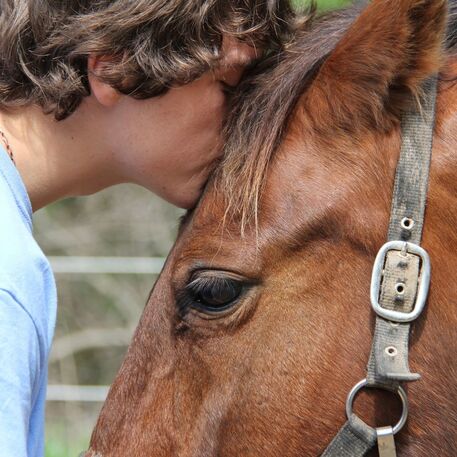 It's the season to be thankful and we have more reasons to be thankful than we can count. Through this crazy year, we wanted to make sure to pause and take a moment of reflection on why we are so thankful for our horses and our wonderful company! Hello, trail friends! Welcome back to our blog. We are taking a break from the trails, and while the horses take a rest and get a snack, we wanted to hop out of our saddles and back into our writing chair. We wanted to check in with all of our readers and supporters, too. We hope you're doing well, spending time with your horses as much as you can, and learning more about our favorite animals every day! With the holidays right around the corner, don't forget to support and love your favorite local small Charleston business. Give the gift of something unique and different this year! Give your loved ones an experience of a lifetime, and gift them with a ride on our amazing trails and the best horseback riding in Charleston! Or even gift yourself with something unique and special this year. Are you visiting our amazing city sometime soon or are you local and looking for something special to experience this holiday season? We can help with that! Make sure to check out the main page of our website and reach out to us to talk about all of your gift-giving needs. We are so excited to speak with you and to have you on our horseback riding trails soon! November is here and Thanksgiving is on our minds. Our horses are dreaming of some extra hay and maybe a few special treats or two. We are all dreaming about our turkey dinners and all the delicious fixings that come with it! Being thankful is also on our minds, and what we've been talking about a lot recently are all the reasons we are thankful for horses and our own personal list of thanksgivings that we've been able to get out of 2020. We thought we'd share our thanksgiving state of mind and pay it forward. In this week's blog, we are going to be talking about all the reasons we're thankful for horses and much more!
What are your favorite reasons that you're thankful for horses? We know the list is endless, and these are just a few of our favorite reasons that we are thankful for every day. Love and thanksgivings have no definition or an end when it comes to horses, and we are sure you understand that. We hope this is a joyful and loving Thanksgiving season for you and yours. Until next time, we look forward to seeing you on our trails soon! In this blog, we are going to be celebrating one of the most popular and oldest horse breeds in the United States, the American Quarter Horse.
Hello, trail friends! Welcome back to the blog! With the dawning of this new month, can you believe there is only a matter of weeks left until the new year? While the year is quickly ending and the weather continues to change, all of us here at Middleton Place Equestrian Center are here to offer the best trail rides and horseback riding in the Charleston area. The weather is still perfectly mild and wonderful to ride in. With beautiful trails intertwining through age-old trees, inspiring views of Middleton Place, and a guide to describe the history and stories we've seen over the years, a visit to Middleton Place Equestrian Center is guaranteed to please friends and family! We offer guided trail rides, tours of the property, and equine boarding with the best care. As of right now, due to the pandemic, please note that we are currently only offering historic trail rides! Enjoy the beautiful weather, the wonderful Lowcountry scenery all while social distancing on the back of a horse. We continue to adhere to the Governors guidelines to help keep our staff and clients safe. All saddles, bridles, and helmets are cleaned after every ride. We are very excited and looking forward to seeing all of you for your next ride very soon! While you are waiting to plan your next ride with us, we wanted to turn back to the history books. In this blog we are going to be sharing the history of one of the oldest and most popular breeds of horse right here in the United States; the American Quarter Horse! Considered one of the oldest and most beloved cultivated breeds in the United States, the Quarter Horse is an incredible example of the melting pot that the United States so proudly boasts to be. The breed itself came from a very long line of breeding some of the most influential and powerful horses from across the globe starting as early as 710. The breed itself saw its true beginning in the 1600s, during the early days of the American Settlers, and was officially solidified in the 1800s with the final addition to the breed, the Mustang. With the addition of the Mustang in its breeding, the modern American Quarter Horse was created and America had its own unique horse native to its shores. Wild Beginnings As we mentioned above, the very beginning of the American Quarter Horses' bloodline can be traced back to 710, when powerful horses were being bred between the North African Barb horses and the native Spanish stock horses. These horses were the ones that accompanied some of the very first Spanish explorers into the new world. They were also the same horses that were left behind by these very early settlers, and many of these horses swam ashore and survived multiple Spanish shipwrecks during these tumultuous years. We have talked about one lineage of these horses a few times throughout the blog, and those are the wild Corolla horses that have made the shores of North Carolina their home. These were not the only horse linage that came from these early settlement horses. Some came into the hands of the Chickasaw Indians that were native to Mississippi, Alabama, and Tennessee. Others went out west to become what we know today as the Mustang. When the second wave of colonists made it to the shores of America in the early 1600s, they brought English stock horses with them. These horses helped them settle the early colonies and survive some of the hardest and harshest years of American settlements. Once they were finally settled, decided they were going to stay, and survived those difficult and challenging years, they could finally have a pastime. One of the most popular pastimes of this generation became horse racing. Colonists were no longer fighting every moment to survive, so they could celebrate with a race or two. When this shift in society happened, the first step in breeding the Quarter Horse happened. Many settlers started trading for and riding the Spanish Barb horses that the Chickasaw Indians had cultivated, cared for, bred, and were known to ride. These horses were then bred with the English stock horses, and the first steps of the Quarter Horse were born. These horses would be bred and cared for over the next 150 years, and according to the American Quarter Horse Association, would become known as the "Celebrated American Quarter Running Horses". The name "Quarter" was given to the horses because this was the distance they were trained to run, about a quarter of a mile on flat grounds in and around colonial towns. The next wave in the development of this breed was in 1752 when a horse named Janus was brought over from England. This stunning horse was the grandson of one of the most influential horses for the foundation of the Thoroughbred horse, the Godolphin Arabian. Once Janus was bred with these blossoming colonial horses, the official prototype of the American Quarter Horse was born, according to the AQHA. These were the horses that lead Americans through the American Revolution and into the wild west and the new frontier. Frontier Horses Once the Atlantic coast had been settled, the itch to continue moving out west was born. American settlers began another great push into unknown lands and the Quarter Horse went with them. These horses, known for their short distanced speed, were now being bred for their stock and strength. Through the early years of the 1800s, this early breed of the American Quarter Horse would be bred with the last few bloodlines that would officially solidify the overall breed. Sir Archy was the first in this line, following by two influential horses named Printer and Tiger. The final piece of the puzzle to the American Quarter Horses bloodline was the powerful Mustang. These free-roaming horses, ancestors of the horses the Spanish explorers left behind, were what made the Plains Indians the strongest mounted warriors that anyone had ever seen, according to AQHA. These new powerhouse horses took settlers out west, help clear and plant this new land, and became the favorites of cowboys and farmers alike. Their strong, stocky, and muscled bodies were perfect for the harsh life and beginnings of the great west, and their gentle dispositions were perfect for caring and interacting with cattle. While farms started to spread across the frontier, so did vast cow farms, all thanks to the Quarter Horse. They were once used as sheer entertainment, and how now become the force of breaking into the frontier. Modern Marvels Today, these beautiful creatures are still bred to have the same features and personalities that broke open the wild west, they just aren't used to forge new lands and farm as they once did. Thanks to the foundation of the American Quarter Horse Association in 1940, the breed became official. New steps were now being taken to preserve the breed. Breeding the Quarter Horse follows incredibly strict guidelines today, and it is dedicated to perfecting the bloodline. The foal has to come from a registered mare and sire to be recognized by the association. They are only allowed to have very limited white markings on their faces and below their knees. There are also only 13 accepted colors recognized by the AQHA ranging from reddish-brown to a stunning grey. They are still known for their muscling, their gentle natures, temperament around cows, versatility, and sprinting speed. While they can still be used for farming, modern technology has moved the Quarter Horses focus and training towards excelling in almost every racing and skilled event that is popular today. With its versatility, the Quarter Horse has become known as one of the most popular breeds, with riding for enjoying being their owner's favorite form of recreation. What a stunning breed and powerful history! They are such influential horses that it is almost impossible not to come across a Quarter Horse at least once in your lifetime. You might even meet one or two at our stables! We hope you enjoyed the history of the Quarter Horse, and we hope this blog has inspired you to book your next visit with us! Until next time, stay safe and stay hopeful everyone! 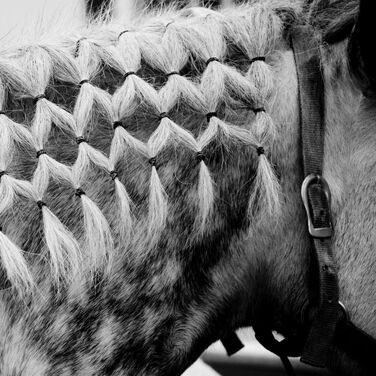 While the seasons begin to change, it's time to start thinking about caring for every aspect of your horses from the tip of their tails to their noses! Let's focus on the best ways to care for your horse's mane and tail! Hello, trail friends! We are back again at our writing desk after taking a break from our saddles! We continue to have incredible rides with our guests that are safe, full of fun, and surrounded by the beauty of the Lowcountry! Have you visited lately? We'd love to hear about your trip! Make sure to comment below after reading this blog! We would appreciate the feedback because we have been loving every moment with you all on the trail! In this two-part blog, we are going to be moving away from the trail and back into the barn. As much as we hate to admit it, we are going to see the weather change and get cooler over the next few months. Rain will mean muddy fields, trails, and paddocks that will cover our horse's bodies, hooves, manes, and tails. While this is very normal, it is also very important that we keep our horses coats, manes, tails, and hooves clean and dry throughout the winter season. This can help promote healthy skin, help avoid sores or irritated skin, and help maintain your horse's overall health. To learn more about caring for your horse during the winter months, follow the link below to one of our past blogs that discusses exactly that! https://www.middletonplaceequestriancenter.com/blog/archives/11-2019 In this blog, we are going to be specifically focusing on the care of your horse's manes and tails. This extra care will not only keep them healthy and happy, but it will also help keep them ready for the next season of competition, riders, tournaments, and more!
You can use more shampoo than you can conditioner. Using a lighter amount of conditioner can help avoid it from getting clumpy or being left in the mane after you rinse. This can cause more dirt to build up and stick to the leftover conditioner or the mane and tail can become very greasy. While washing or conditioning avoid tangling it or adding to existing tangles. You don't need to scrub back and forth, according to Horse and Rider. This will also help avoid irritation, itching, and rubbing if you remove the dirt and thoroughly rinse the mane and tail. According to US Equestrian, instead of using large quantities of conditioner, spraying a clean damp mane after the wash with leave-in condition can help with keeping it healthy and shining. Spray on before brushing, and once the mane and tail are dry, you can then begin the brush! How does your current brushing, washing, mane, and tail maintenance stand up to this list so far? Are you already a pro, or do you think you might have some work to do? No matter what path your on, as long as you're working towards helping your horse have the best skin, mane, and tail, then you're doing great. Who knew that manes and tails needed so much care? This is just one of the many aspects of caring for just one horse, can you imagine how much time it takes to do this for multiple horses? Owning and caring for a horse takes extreme responsibility, and you must be ready to take it all on if you're wanting to provide the best life possible to your horse. If you have any questions about the care of your horse between now and the second part of this blog, don't hesitate to reach out. We are here to help you care for your horses as best as possible. Until next time, stay safe and stay hopeful everyone! One of the most mysterious and stunning horse breeds of all time is the Gypsy Vanner Horse. Have you heard of these beauties? We can't wait to introduce you to them!
Hello, Lowcountry! We hope this blog finds you healthy and happy! Things are going well on our trails. Our fantastic guides are ready to lead you on an exciting adventure with our beautiful horses. We are currently offering our historic trail rides. These rides are the perfect choice to enjoy the beautiful local landscape and to learn a little bit about the history of Charleston. We have thee trail rides every day, one at 10 AM, 12 PM, and 2 PM. If you're planning on joining us, please arrive 15 minutes early. If you're a first-time rider or a first time guest on our trails, please visit our FAQ page. If you happen to have any questions, please don't hesitate to reach out to us. Please visit our "Book Your Ride" page on our website to book your next trail ride with us today! Did you happen to watch The Kentucky Derby after reading our last blog? We hope everyone who did still wore their favorite Derby outfits while enjoying a Mint Julep or two! Our congratulations to Authentic and his trainer Bob Baffert for winning in a surprising and very dramatic turn of events. Authentic pulled right in front of Tiz The Law who won The Belmont Stakes and was favored to win the Derby. We are sure you're just as excited as we are to see who will win The Preakness Stakes on October 3rd! There are many stunning horse breeds across the globe, a few of which we have talked about in past blogs. What many of our readers might not know is that new breeds are still out there and are still being introduced to the United States. One of the newest breeds that have come to the United States and received almost overnight popularity is the Gypsy Vanner horse. Thanks to Dennis and Cindy Thompson, these stunning horses first immigrated to the United States in 1996, and the Thompson's established The Gypsy Vanner Horse Society. In 2015, there were over 4000 Gypsy Vanner horses registered in the society, and they are still incredibly popular today. From the beginning the society has been dedicated to breeding preservation, learning about the culture that created this selective breed, and staying true to the breed itself. They do so through education, evaluation, and horse registration. These magical and striking horses have a very interesting story. For years, the Englishman didn't care for horses that weren't a solid color. Horses that had spots or splotches on them were most often found in Ireland and the surrounding areas. These colored horses were very often cast-off in English culture. Thanks to the English the Gypsy culture was introduced to these beauties and instantly fell in love with them. These Gypsies were predominantly found in the British Isles. There is a lot of speculation as to why they decided to selectively breed what would become the Gypsy Vanner. The most popular speculation is that the Gypsy culture wanted a sturdy and strong horse with an amazing temperament that was stunning to look at. After years of careful breeding, that is exactly what they achieved. These beautiful horses and their breeding went undocumented until almost the 1940s. Once WWII arrived, the horses were finally cataloged and traced as a true breed. These stunning horses are a mix of very impressive horses; the Shire, the Clydesdale, and the Pales. They are cold-blooded horses, which all feather horses are according to the GVHS. They are shorter horses ranging between 12.2 to 16 hands. They are stocky and strong like a Clydesdale and have a draft-type build. They are perfect for riding and driving, and for any level of rider. They are very easy to train and have calm and sweet personalities. They are wonderful with children and for older riders who might have a difficult time getting on and off their horse due to pain and age. When they came to America, the Gypsy Vanner didn't have an official name. Thanks to the Thompson family, the name they decided upon honored their origins and the skill they were originally bred for. Named for the Gypsies that bred them and the caraVAN that they were bred to pull, the official name of Gypsy Vanner was born. While they were bread to match and pull the stunningly decorated living caravan wagons that the Gypsies once lived and traveled in, the use of these wagons is now just for show and fun. While this way of life may have turned into fun, the beauty and the strength of these horses remain. The Gypsy Vanner can come in a variety of colors, but they are most often found in skewball, which is a mix of black and white, or piebald, which is a mix of brown and white. When you see a Gypsy Vanner for the first time it is very easy to confuse it with a Palomino or Paint horse, but pay close attention, you'll be able to spot the differences. Gypsy Vanners are known for an abundant amount of hair in their manes and tails. They can have double manes, and they can grow their manes down past their knees. The stunning feathering they are known for begins at their hock and cascades over their powerful hooves. With such incredible temperament, strength, and ability to train, the Gypsy Vanner sounds like the picture-perfect horse. Honestly, this isn't far from the truth. One of the very few downfalls is the upkeep they require for their stunning manes, coats, and feathering. Extra care has to go into their grooming to keep them safe, healthy, clean, and ready to show. They also come with a high price tag. If you are interested in purchasing a Gypsy Vanner, we encourage you to consider the responsibility and care that comes with these beauties before officially buying one. Rising in popularity, these horses are being seen more frequently at shows and in competitions. Due to their popularity and price tag, it will be very hard to find one to adopt. The best way to go about owning one is to go through a private breeder. These horses are truly something special. If you haven't seen one in person, make sure to make that a priority. We do not doubt that it will be love at first sight. Until next time, stay safe and stay hopeful everyone!  Every industry has been touched by the effects of the current worldwide pandemic. The world of horses and horse racing has been no stranger to these impacts. Since the pandemic shut the world down in February and March, every industry has felt those reverberations. Quickly gaining on six months of this strange new world here in the Lowcountry, we too have felt the world shifting. We have changed our policies and what services are available to our riders and guests to keep everyone safe and healthy. When the nation started closing down and canceling major events, it was no surprise that horse tracks and horse races started to shut down and cancel in the footsteps of the NBA, NFL, MLB, and the PGA. Every industry has felt the shock waves of these effects, and all of us at home have felt the tremendous loss these decisions have caused. Out of the safety of our nation and its people, we recognize the importance of these decisions, but there is plenty still left to mourn. What should come as a surprise is that even though it drastically changed, the industry of horse racing didn't actually shut down. In a recent interview, racing analyst Randy Moss mentioned that even though the world has changed and we've adapted to an online world, the world of horse racing can't be stopped. He said, "You can't water or feed horses through Zoom. They can't get veterinary care through Zoom!" So, those behind the scenes, almost 1500 people to every 1000 horses at each American race track according to Moss, have kept the industry afloat. The needs of these living and breathing creatures depended on quick action, which is exactly what happened. Decisions were made to keep both the industry and the industries employees alive and well. This doesn't mean that every race and event went on as normal. Once things started to shut down it was almost like a domino effect, and it was felt globally.
One of the largest blows our industry saw was the postponement of the Kentucky Derby. For the first time since 1945, it was pushed back to a different date. After weeks and months of waiting, Churchill Downs announced that the race was going to be moved to September 5th. With this change, the entire set up of the Triple Crown was completely changed. For the first time in its 152 years, the Belmont Stakes started the Triple Crown instead of ending it. On July 20th, the race still went on as planned. Here too, no fans were present. Tiz The Law took first. The hope that the Kentucky Derby would be able to have fans in the stadium was still in the works when the date was pushed back. Many believed that by September, things would be looking much different. During June and early July of this year, it was announced that 14% of the Derby's capacity would be allowed to attend in person. Social distancing and masks along with frequent hand washing and sanitizing were going to be strongly suggested. Whether masks were going to be enforced or not was never solidified, according to CBS news. This decision and the uncertainty of masks were met with skepticism. As weeks went on and the spike in Coronavirus cases went up drastically, the executives of Churchill Downs decided to change their minds. According to CNN, the race will still be run, but without a crowd. The 14% capacity was still 23,000 fans, and that was too much for comfort. Kentucky governor, Andy Beshear, has praised the decision according to CNN. Although it is a tragic disappointment and loss, it is understood. Following the Kentucky Derby will be the Preakness Stakes on October 3rd, officially finishing the Triple Crown of 2020. The derby was one of the last big sporting events to see such a change. 2020 has been a huge blow to every industry and sports lovers alike. Throughout Europe, with pandemic numbers looking more promising, they are hopeful for races that were postponed to the fall. Many of these races will be run much later than they ever have been before. They hope that by pushing them back they will be able to amp up even more excitement and be able to have some, even if it is limited, crowd engagement. What has 2020 done to your connection to the world of horses? Comment below - we want to hear from you! Until next time, stay safe and stay hopeful. The next Year Of The Horse might not be until 2026, but for us, it's every day! We wanted to share and explore the history behind the zodiac horse and what it means to be born in a year of the horse.
We hope while you're reading this, we find you happy and well. We've enjoyed seeing so many of your friendly and familiar faces back on our trails. For those of you new to our blog or for those of you who might be unaware, we are currently open and offering our Historic Trail Rides! Enjoy the beautiful weather, the wonderful Low Country scenery, all while socially distancing on the back of a horse. We are adhering to the Governor's guidelines to help keep our staff and client safe! All saddles, bridles, and helmets are cleaned after every ride. A visit to the stables might be exactly what you need right now. This year has been a rough ride, to say the least. We've all overcome and gone through challenges in all areas of our lives. Depending on the culture, some look to Farmers Almanacs to predict or look for answers for a difficult year. Some look at astrological coincidences and others look at the zodiac sign to help explain the reasoning behind what is happening in their region or throughout the world. This year in the Zodiac calendar is the year of The Rat, and there won't be a year of The Horse until 2026. Regardless, we wanted to learn a little more about the history of the Horse Zodiac, it's personality traits, and what it could mean during the year of The rat. The most recent Year Of The Horse were 1942, 1954, 1966, 1978, 1990, 2002, 2014 and soon to be 2026.
Ironically, even if you don't believe in the zodiac signs or know much about them, 2020 does resonate with what has been predicted. We, like all of you, hope to find good luck in what's left of this year. But, if anything, learning more about this beautiful creature in the eyes of a different culture has been very interesting. What did you think? Comment below! Also, let us know if you were born in a previous year of The Horse or know anyone that was. Does their personality match the descriptions we've listed? Are you finally in the market to buy a horse of your very own? We have some tips and suggestions that can make the process smooth and simple.
This summer weather is not a joke! We love being outside with our horses and on the trails with all of you every time you visit. But, this heat index is crazy! We can't stress enough that keeping yourself and your horse hydrated needs to be your top priority right now! Don't forget your sunscreen and bug spray, too. We've seen a lot of horse flies recently, and those bites are not pleasant. Since many of us are spending a good amount of time at home right now, more of you might be thinking about buying a horse of your very own. A few blogs back we talked about some steps and what to expect when adopting a horse here in South Carolina. If you missed that blog, please follow the link below to read: https://www.middletonplaceequestriancenter.com/blog/adopting-a-horse-in-south-carolina We understand that you might want to go a different way when getting a horse of your very own. There is no wrong way of doing this, it is all a personal preference. But, before you make the big step in buying your horse, we wanted to share some tips and ideas to keep in mind before you do and while you're going through the process.
We are so excited that you are thinking about bringing a horse into your family, and we hope these tips and suggestions cleared up any questions or hesitations you might have. Until you do make this dream become a reality, don't forget we are still open for our historic horseback trail rides. They are the perfect way to get outdoors, be safely distanced, and visit with your favorite animals. For more information, please visit our website. Until you join us for your next ride, please continue to stay safe! We are Charleston's premier horseback riding trail, dedicated to keeping you safe while exploring the beauty of the Lowcountry. Curious about what you might find when riding on our trials or on trails of your own? Here are some important accessories you need to know about!
Happy June, everyone! Let's continue to get back in the saddle one day at a time. When joining us for your next trail ride, there might be a few needed accessories that you might not know what they are or what they do. Don't worry! We are here to help guide you. Also, everything you need for your next visit with us will be provided. We are taking very serious steps to keep our guests and employees very safe. Everything you touch and come in contact with will be very safe and clean. But as you prepare to come to visit us, we wanted to share some information about some important trail riding accessories. This information is also great for those who want to explore trails out in the wild or who might want to invest in their trail riding equipment. Don't forget, our historic trail rides are open and available to the public. You don't want to miss this beautiful and unique experience this summer! Each of the items we will be talking about today makes riding and any experience on or with a horse much more prepared, easier, and comfortable for both parties involved. They help keep the quality of the ride enjoyable and can come in handy to keep you safe and protected in any situation.
Have you seen or used some of these accessories before? Or are they all new to you? We are excited to help continue and nurture any education when it comes to our beautiful horses and everything it takes to ride them safely and properly. The trails are calling you, so what are you waiting for? Until you join us for your next ride, please continue to stay safe! We are Charleston's premier horseback riding trail, dedicated to keeping you safe while exploring the beauty of the Lowcountry. |
AuthorMiddleton Place Team Archives
January 2021
Categories
All
|
|
4280 Ashley River Road, Charleston, SC 29414
[email protected] 843-735-0709 Please also visit: Middleton Place | The Inn at Middleton Place |
Site powered by MadeSimply
|
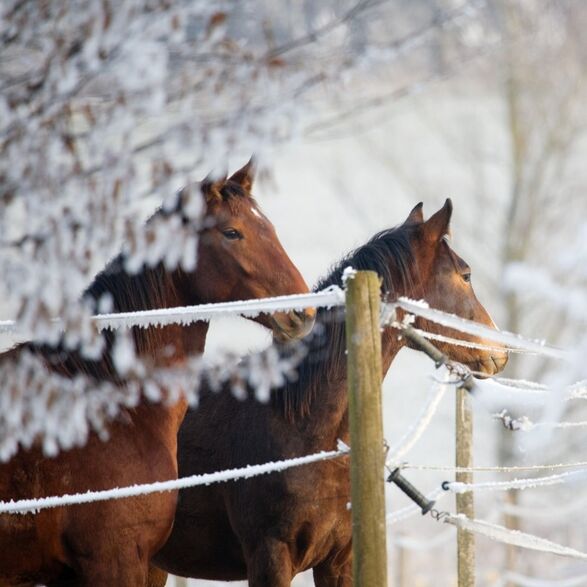
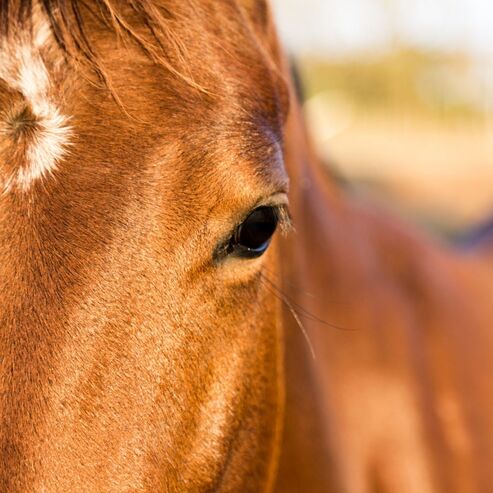
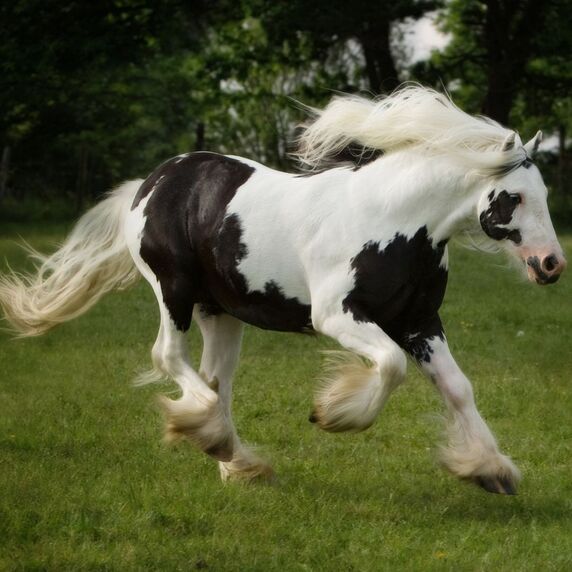

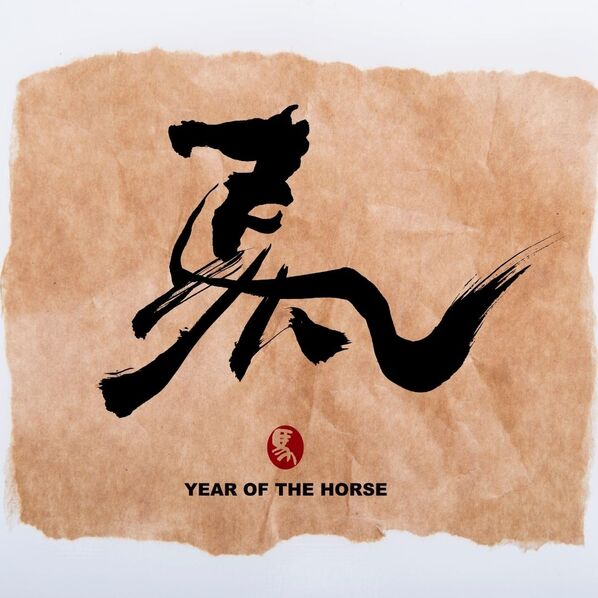
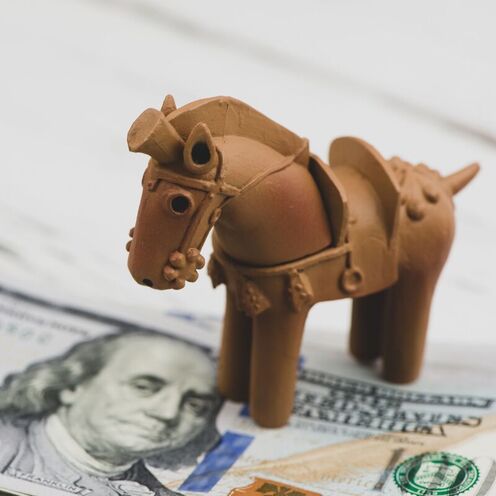
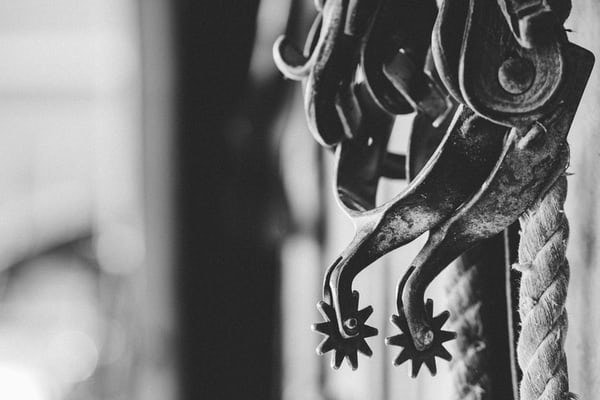
 RSS Feed
RSS Feed

